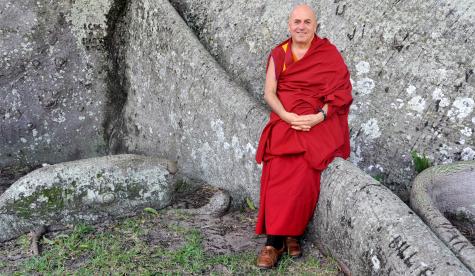
American neuroscientists have pronounced Matthieu Ricard, a Tibetan Buddhist monk and a French cellular geneticist, the happiest person they've tested.
On Sunday, Ricard told an audience of more than 100 people at the Royal Poinciana Chapel what he thinks it means to be happy.
Happiness is not euphoria, but a deep and lasting sense of fulfillment achieved through emotional control and focusing on the well-being of others, he said.
Ricard distinguished happiness from pleasure, which he said is dependant on physical sensation and temporary external circumstances ultimately beyond our control.
The physical pleasures we seek can be tied to greed and obsessive behavior that brings torment, he said.
Happiness, Ricard said, is a way of being that is achieved by cultivating compassion and freeing our minds of hate, envy, anger and other destructive emotions.
You can't love and hate at once, he said. So love, and you won't hate.
"The more you experience loving kindness and peace, it's not going to fade away like pleasure," Ricard said. "It's self-increasing, and gives you strength and resources to deal with the ups and downs of life."
Ricard, 60, lives in Nepal and is an associate of the Dalai Lama.
Ricard grew up in Paris exposed to French intellectual circles. After completing his doctoral thesis in molecular genetics at the Institut Pasteur in 1972, he abandoned a scientific career and moved to the Himalayas to concentrate on Tibetan Buddhism.
His photographs of the spiritual masters, the landscape, and people of the Himalayas have appeared in books and magazines.
Ricard's books include Happiness: A Guide to Developing Life's Most Important Skill, and The Monk and The Philosopher, a collection of dialogues between Ricard and his father, the late French philosopher Jean-François Revel.
During Sunday's speech, Ricard acknowledged that anger, like other emotions, is part of human nature and takes time to master. But he said illness is also natural, but that doesn't stop people from seeking to avoid or cure it.
Devotion to easing the suffering of others is key because it focuses us away from ourselves, thus allowing happiness to flow into us, he said.





